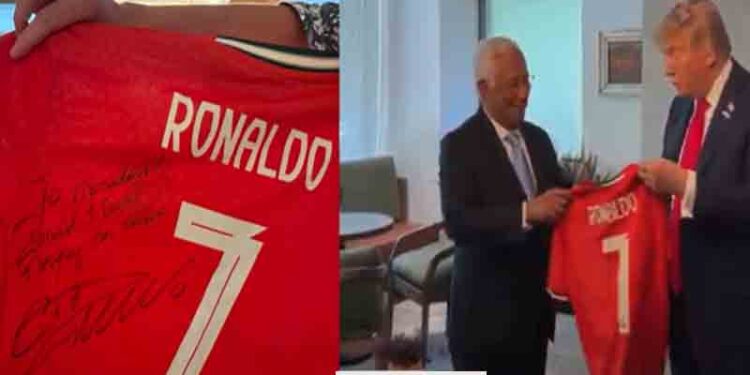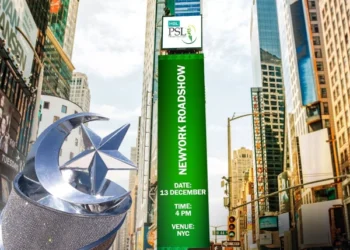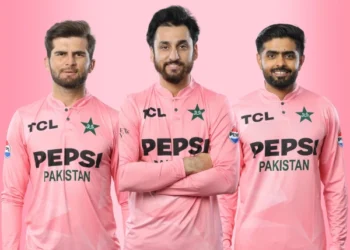Introduction: Ronaldo Steps Into Diplomacy
In an extraordinary gesture that blends sports and diplomacy, world-renowned football superstar Cristiano Ronaldo has sent a symbolic gift to former U.S. President Donald Trump — a signed Portugal national team jersey bearing his iconic number “7”, along with a special message of peace. Delivered through the President of the European Council, this gift is being hailed as more than just a personal token; it represents an athlete’s powerful voice for peace in an increasingly divided world.
This diplomatic move by one of the most influential sports figures globally arrives amid escalating global tensions — particularly in the Middle East involving Iran, Israel, and other flashpoints — and is seen as an unconventional but hopeful effort to promote dialogue, unity, and conflict resolution.
The Symbolic Power of a Jersey
More Than a Piece of Fabric
Cristiano Ronaldo’s signed Portugal national team jersey is not just a souvenir. For millions of fans worldwide, it symbolizes excellence, unity, and inspiration. The number 7, synonymous with Ronaldo’s legacy, has become iconic in football history. His decision to use this symbol to convey a message of peace transforms it into a tool of soft diplomacy.
The jersey reportedly included a handwritten note addressed to former President Trump, urging efforts toward global peace, de-escalation of international conflicts, and a reminder that sports can transcend political boundaries.
Delivery Through European Council President
The signed jersey was delivered to Donald Trump by the President of the European Council, a high-level diplomat who has engaged in various international peace dialogues. This indirect route of communication lends the gesture a diplomatic weight, suggesting that the message is not just from a celebrity, but part of a broader European appeal for global de-escalation and cooperation.
A Message That Resonates Beyond Football
Ronaldo’s Appeal for Peace
Ronaldo’s message reportedly emphasized the urgent need for dialogue between nations and the cessation of hostilities, particularly in regions on the brink of war. While the full content of the message has not been made public, sources close to the European Council suggest it included phrases such as:
“May peace prevail where tensions grow, and may understanding replace division.”
Such a message is timely given the ongoing hostilities between Iran and Israel, the recent cyberattacks and missile strikes, and increasing fear of wider military conflict in the region.
Context: Rising Global Tensions
Middle East at a Flashpoint
The world is witnessing a particularly volatile period, with multiple international crises dominating headlines. The Iran-Israel conflict has escalated through missile attacks, drone warfare, and cyber operations. In recent weeks, Haifa’s oil refineries have been hit, Israeli cities have suffered civilian casualties, and infrastructure in both countries has been compromised.
Amid these hostilities, concerns have been raised that global powers — including the United States — may become more deeply involved, whether diplomatically, economically, or militarily. Ronaldo’s gesture appears to respond to these developments, advocating peace over confrontation.
Sports as a Vehicle for Peace
Athletes as Global Ambassadors
Cristiano Ronaldo is not the first athlete to step into the realm of global peace and diplomacy. Throughout history, sports icons have used their platforms to speak out against war, injustice, and inequality. Muhammad Ali refused to serve in the Vietnam War. Didier Drogba played a key role in reducing civil conflict in Ivory Coast. Now, Ronaldo appears to be using his immense popularity to support global peace initiatives.
With over 600 million social media followers, Ronaldo’s voice carries extraordinary global influence. His action sends a message that sports personalities are not confined to fields and stadiums — they can be champions of diplomacy, empathy, and global unity.
The Unconventional Nature of Ronaldo’s Message
A Peace Gesture Outside Government Channels
What makes this move particularly noteworthy is that it did not originate from a government or international organization, but from a private citizen and sports celebrity. In diplomatic circles, such informal gestures are often seen as soft power efforts — non-coercive strategies that influence global affairs through culture, dialogue, and symbolic communication.
Experts in international relations are describing this as a “positive and unconventional peace effort”, signaling that people from all walks of life — even athletes — can contribute to peacebuilding in their own unique ways.
Reactions to the Gesture
Public and Diplomatic Response
Though there has been no official statement from Donald Trump in response to Ronaldo’s gesture, the story has drawn considerable attention on social media and within political circles. Many view it as a refreshing and humanizing act during a time when much of the international discourse is dominated by aggressive rhetoric and military threats.
On social media, fans praised Ronaldo for “using his platform for good,” while political analysts noted that such acts, although symbolic, can influence public opinion and encourage leaders to pursue diplomatic alternatives.
A Continuing Pattern of Ronaldo’s Social Engagement
Not Just About Football
Cristiano Ronaldo has been involved in multiple philanthropic efforts over the years. He has donated millions to children’s hospitals, supported disaster relief efforts, and advocated for child welfare through various charities. This recent peace gesture aligns with his history of using fame for broader causes.
“Cristiano Ronaldo is not only a footballer — he is a global icon and role model,” said one European diplomat. “His voice matters, especially when he speaks about peace.”
Donald Trump and Foreign Policy Legacy
The Target of the Message
While no longer in office, Donald Trump remains an influential political figure in the U.S. and may be a potential candidate for the 2024 elections. His foreign policy during his presidency included controversial decisions such as the withdrawal from the Iran nuclear deal (JCPOA), increased sanctions on Iran, and strong alignment with Israel.
Ronaldo’s peace message to Trump could be seen as a gentle nudge toward a more balanced, diplomatic approach should he return to office. The gesture encourages former and future leaders to reflect on non-military paths to resolving conflicts.
Conclusion: A Jersey for Peace
Cristiano Ronaldo’s gesture of sending a signed Portugal national jersey with a heartfelt peace message to Donald Trump is a poignant reminder of the potential impact that public figures can have on global issues. It is a call for unity, understanding, and dialogue in a world increasingly marred by division and hostility.
By stepping into the arena of peacebuilding, even symbolically, Ronaldo has shown that athletes can be much more than entertainers — they can be agents of change, capable of influencing hearts and minds far beyond the football pitch.

























